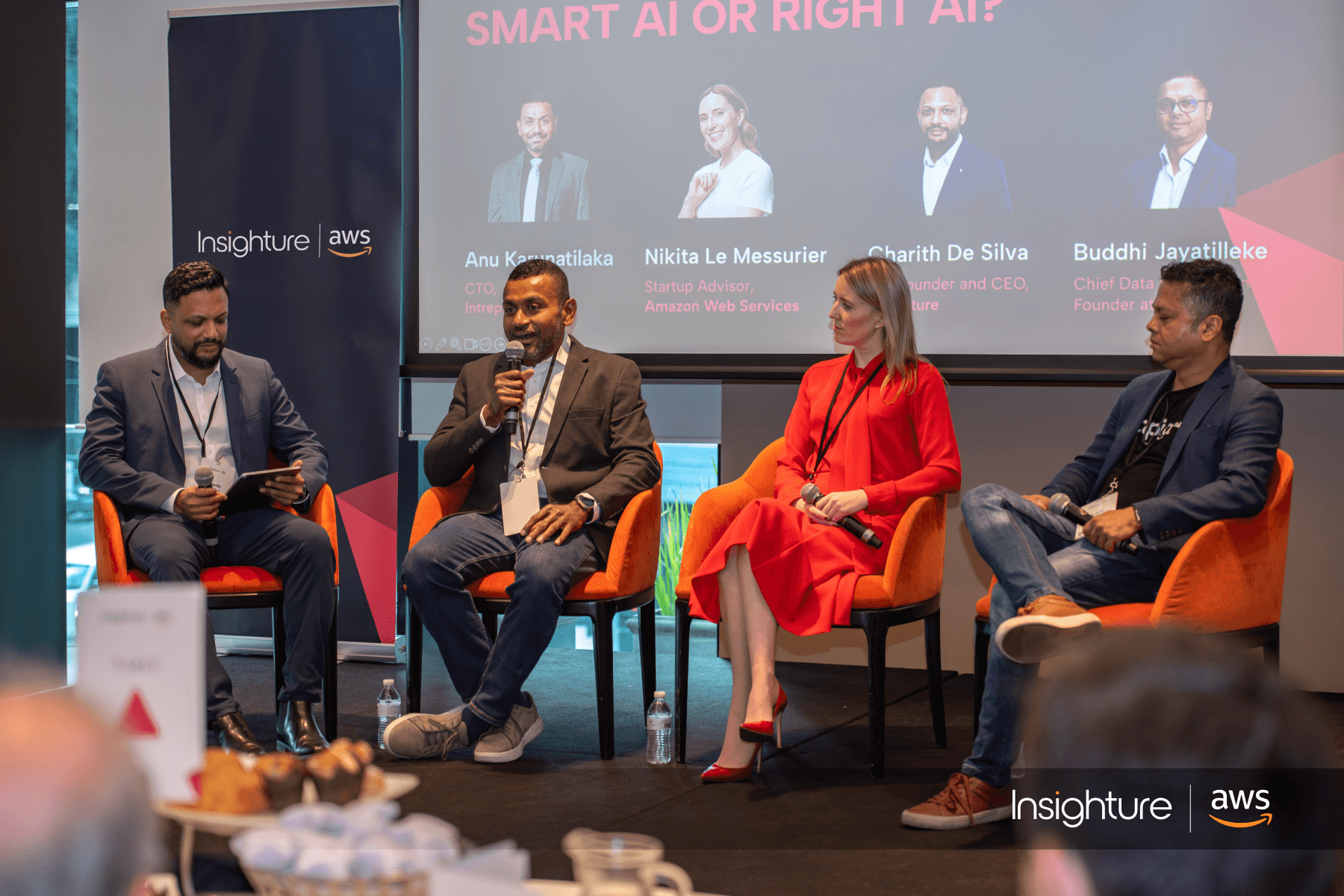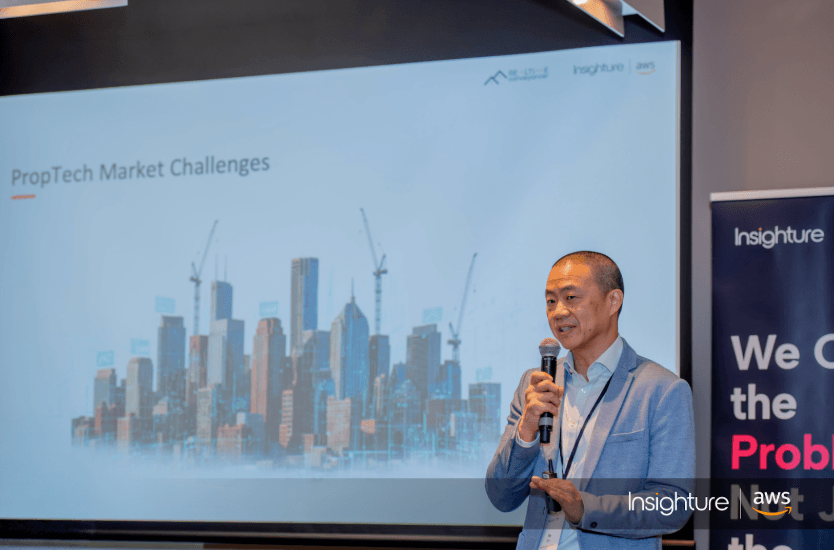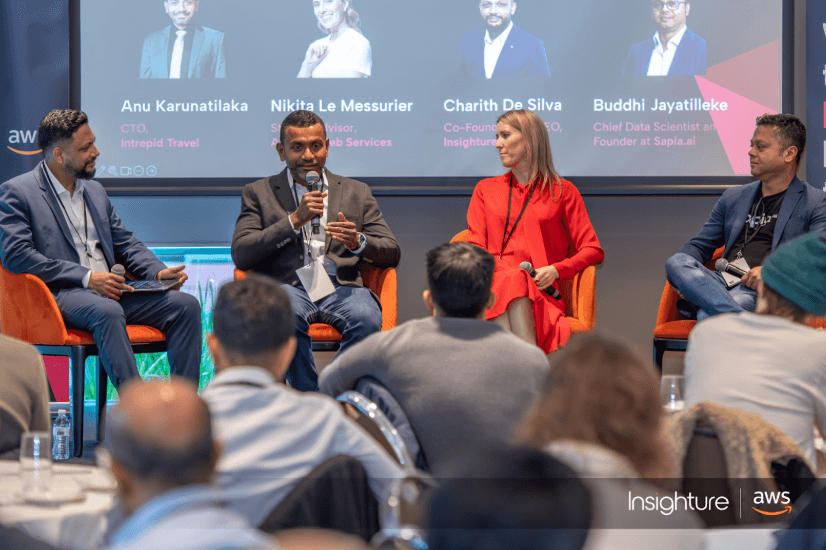Smart AI or Right AI: Insights From Our CXO Breakfast With Amazon Web Services (AWS)
Deanna Sameer
01 Sep, 2025

On August 28th, we hosted the Insighture X AWS CXO Breakfast Connect to facilitate a technical discussion on a critical topic for today's leaders: the distinction between 'Right AI' and 'Smart AI'. The objective was to move beyond the hype and focus on the practical challenges and frameworks for successful AI implementation.
Keynote Summary: Thriving in the CTO Pressure Cooker

The event began with a keynote from passionate COO & CTO in the proptech sector, Tin Tran. Tin is a valued client of Insighture’s whose customer story rings true for most players in the conveyancing market in Aussie today.
In his talk, Tin shared how Realtime Conveyancer addressed the critical challenge of evolving from a reactive start-up to a strategic scale-up. He argued that the very culture that fuels early growth can later create organisational chaos, hindering progress. The essential solution is not simply more technology, but a foundational reset of the company's culture and operations. By first establishing clear strategic alignment, a business creates the stability necessary to leverage powerful enablers, such as AI and strategic partnerships, effectively. Tran’s core message is that the intense pressure on modern leaders, when channelled through a well-structured organisation, becomes a powerful catalyst for transforming potential burnout into sustainable growth.
Defining 'Right AI' in Practice
The core of the event was a fireside chat moderated by our CEO, Charith De Silva, featuring panellists from AWS, a CTO of a global travel company, and the CTO & CDO of an AI-native startup.

Seated from left to right: Charith De Silva (Insighture), Anu Karunatilaka (Intrepid Travel), Nikita Le Messurier (AWS Startups) and Buddhi Jayatilleke (sapia.ai).
Characteristics of "Smart AI":
The panel characterised "Smart AI" as a technology that often exists as a Proof of Concept (POC) or an impressive demo. While it typically excels at a narrow, isolated task with high accuracy, it generally lacks integration with core business systems and processes.
Characteristics of "Right AI":
- Production-Ready: Engineered for reliability, scalability, and monitoring. It is built to handle real-world, messy data.
- Integrated: Connects seamlessly with existing technology stacks and business workflows.
- Governed and Auditable: Complies with security protocols, data privacy regulations, and can be audited for fairness and decision-making.
- KPI-Driven: Its success is measured not by model accuracy alone, but by its direct impact on a predefined business objective such as customer churn reduction, supply chain efficiency, or revenue uplift.
“Smart AI impresses. Right AI ships, scales, and stands up to audit.”
Actionable Frameworks from the Panel
The discussion ended with practical advice that leaders can apply immediately:
Problem-First, Tech-Second
Before allocating resources, rigorously define the business problem and the specific KPI you intend to impact. Only then, evaluate if AI is the most effective tool to solve it.
According to Nikita Le Messurier, Startup Advisor at AWS, fewer than 30% of startups are bringing a value-driven AI product to market that achieves and maintains a lasting presence.
"If startups are managing just 30%, what is happening in the enterprise space? This is about the narrative that considers AI as a 'science project' rather than a business initiative. Once you adopt the lens that GenAI projects need to have a KPI-driven, business-value approach over one that is just fun, smart, and interesting… that’s how you’re going to win and stay in market".
Prioritise Customer Value over Technical Novelty
Frame every AI initiative through the lens of the customer. Does it remove friction, or does it remove a valuable human connection? The right AI enhances the customer experience.
Intrepid’s CTO, Anu Karunatilaka, said their human-centric AI enablement approach was interesting in that they "automate the predictable and humanise the exception."
He elaborated on their philosophy: "'Is that right for the business? Should we keep that bit of the business human?' We don't want to be an AI company. We are a travel company; we want to use AI to become a better travel company."
He also spoke about business transformation not being just about automation, like ChatGPT, but about workforce and process redesign. He warned against AI simply being used to "do bad processes faster."
Implement Disciplined Experimentation
Establish a framework for rapid testing of AI initiatives. Crucially, define clear success/failure metrics upfront to allow for quick, data-driven decisions to either scale or terminate a project.
This is a problem Buddhi Jayatilleke, Chief Data Scientist at sapia.ai, is actively solving. He offered a powerful example of how new AI-powered tools are transforming traditional roles to accelerate this very feedback loop. He explained that the role of a product manager is evolving from creating concepts to building fully functional prototypes.
"A product manager can actually create a working prototype... and that becomes the blueprint for the engineering team," he noted. "You don't go to users with concepts; you give them a working prototype to experience and give feedback on."
To wrap up…
The recent practitioner roundtable surfaced critical considerations for building effective, production-ready AI systems. The fireside chat, moderated by Insighture CEO Charith De Silva, moved beyond specific tools to address the socio-technical challenges of AI adoption, particularly its impact on engineering culture and team structures.
A core takeaway was the pragmatic distinction between 'smart' AI, i.e. often brittle, proof-of-concept models, and 'right' AI, which is engineered for the realities of production. This 'right' approach treats security as a foundational, continuous concern and demands a focus on scalability and sustainability, including the question of carbon neutrality of the underlying platforms.
The discussion highlighted the technical alignment between AWS and Insighture. Both organisations champion a product mindset that prioritises owning the business problem over simply delivering a technical artefact. This is a shared philosophy essential for building capabilities that create durable value. This is the foundation of an expanding collaboration, with more joint work planned to build out these critical capabilities. We are truly excited for what is to come!

More about the author:
Deanna Sameer
Deanna is a Growth Marketing Consultant at Insighture, supporting marketing and communication efforts across content, brand, and digital. With a passion for storytelling and a focus on meaningful engagement, she drives Insighture’s brand voice and growth initiatives across digital channels.